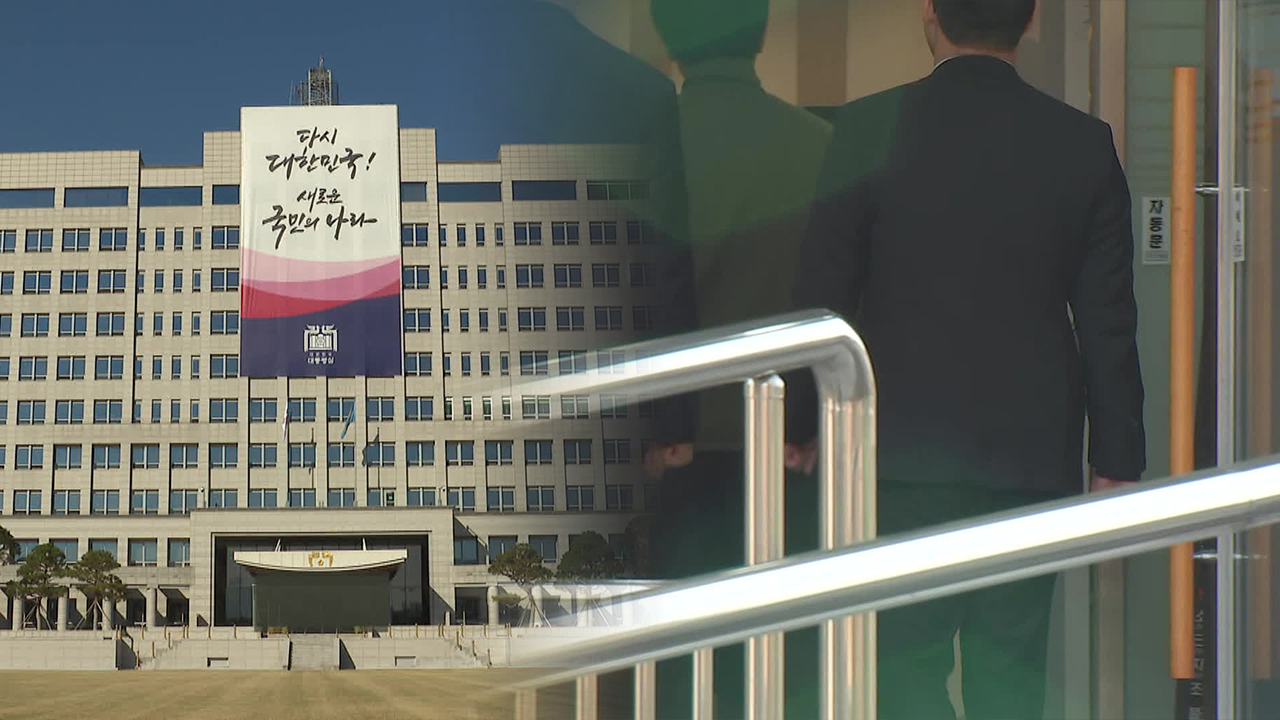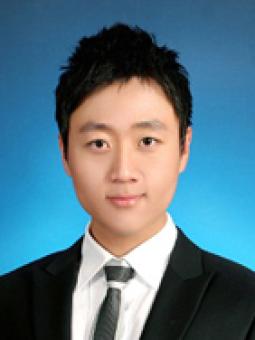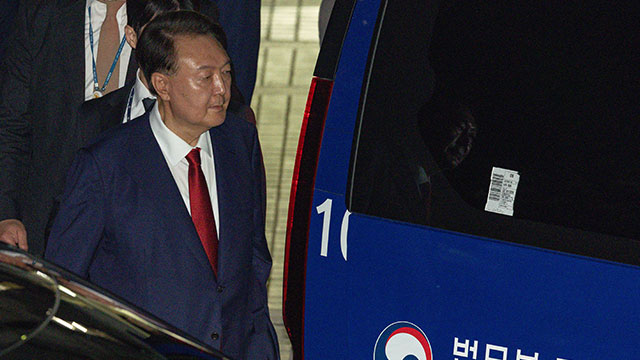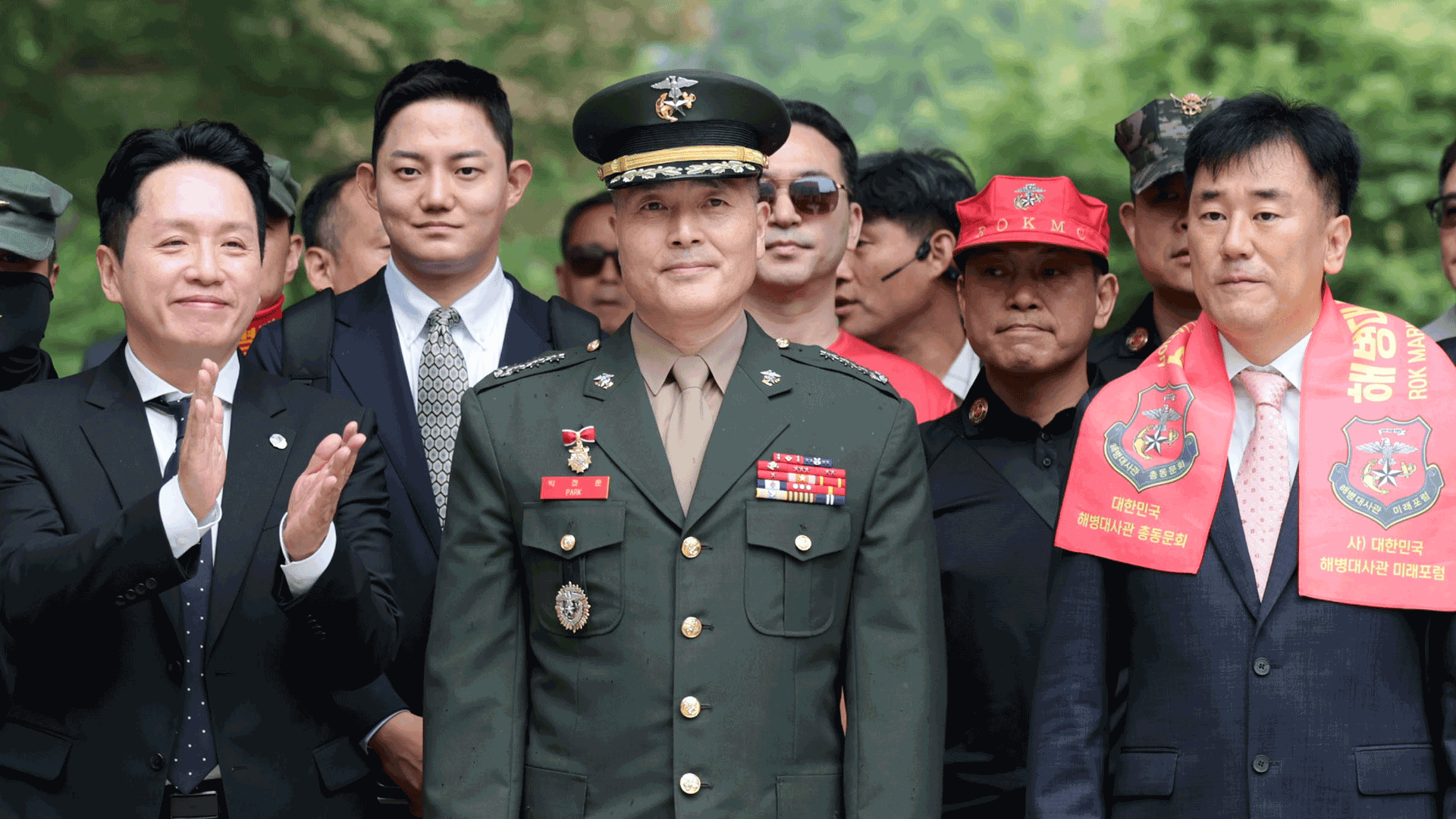Aftershock of emergency martial law: Inner thoughts of presidential office and political parties
입력 2024.12.12 (00:52)
읽어주기 기능은 크롬기반의
브라우저에서만 사용하실 수 있습니다.
[Anchor]
The political arena is currently clouded with uncertainty.
The ruling party is divided over the timing of president's resignation, the opposition party claims there are no alternatives other than impeachment, and President Yoon, who has been in seclusion for several days, adds to the complexity of the situation.
Let's hear more details from our political reporter.
Reporter Kim Jin-ho, there have been reports from journalists covering the presidential office suggesting that the president may accept impeachment.
How should we interpret this?
[Reporter]
Yes, it may be inappropriate to calculate political strategies in the current situation.
However, there are some aspects to consider waht choices both parties might make based on the current pros and cons.
If we interpret the situation so far, President Yoon seems to have three main options.
The first option is to maintain a de facto retreat, as the president mentioned in his two-minute address. Another could be resignation depending on the timing, and the third is accepting the impeachment motion.
Maintaining a retreat seems quite difficult in light of the current public sentiment.
So, is voluntary resignation possible? If he resigns voluntarily, he would have to face investigations into the charges of insurrection as a civilian and go through trials.
The National Assembly is demanding two types of special prosecutors: general and permanent special prosecutors.
There is also a government investigation.
To respond to these matters, it may be necessary to hold the constitutional position of president.
From the president's perspective, he might consider accepting the impeachment motion passed by the National Assembly and contesting it in the Constitutional Court.
If the impeachment motion is passed, the Constitutional Court must reach a conclusion within 180 days, or six months, and there is a possibility that he will decide to accept the impeachment motion to have sufficient opportunities for defense during this time.
Even filling the three vacant positions of Constitutional Court justices would require at least until the end of the year, including confirmation hearings.
Coincidentally, it is also possible to interpret that there may be a common ground between the opposition's call for immediate impeachment and the presidential office's stance.
[Anchor]
It seems the ruling party is facing a very complicated situation.
There are differing opinions within the party; what are the underlying motives and intentions of the People Power Party?
[Reporter]
Some interpret that the person in the most difficult position right now is the leader of the People Power Party, Han Dong-hoon.
The awkwardness of Leader Han is evident just by looking at the changes in his stance so far.
On the night of December 3, Leader Han entered the main assembly hall and led the ruling party's efforts to prevent the president's emergency martial law.
However, on the 5th, he stated that he would "work to ensure that impeachment does not pass," and the next day he mentioned the need for "prompt suspension of duties" while referring to the attempts to arrest politicians.
But on the day of the impeachment vote, he mentioned the "necessity of the president's early resignation," citing the need to minimize confusion as the reason.
From Leader Han's perspective, while prompt suspension of duties is necessary, supporting the impeachment motion seems to have faced considerable backlash from the party's support base.
On the other hand, the plan to operate the government under Prime Minister Han Duck-soo with the president's position maintained and support from the ruling party is strongly opposed by the opposition.
Within the ruling party, there is a significant sense of crisis that if a presidential election is held in the current state, it would hand over power to the Democratic Party's Lee Jae-myung.
This is the so-called impeachment trauma.
Therefore, it seems that they have come to the point of deciding on a roadmap for the president's resignation in February or March next year.
In this situation, the possibility of the president accepting the impeachment motion has been raised, making it difficult to predict the outcome of the impeachment vote scheduled for this Saturday at 5 PM.
As of today, there have been about five public "defections" within the ruling party.
Since eight votes are needed for the impeachment motion to pass, Leader Han is also seen as having reached a point where he should make an important political decision.
[Anchor]
The Democratic Party is relatively clearly continuing to call for immediate impeachment.
But are there any factors within the Democratic Party as well?
[Reporter]
As you mentioned, the Democratic Party is maintaining a clear stance on "immediate impeachment."
However, if I had to point out one factor, it would be the second trial of the election law case involving Democratic Party leader Lee Jae-myung.
The first trial verdict was delivered on November 15.
If the second trial upholds the first trial's disqualification from candidacy, it could be a significant political blow for him.
This is also mentioned as one of the backgrounds for the ruling party's argument for "orderly resignation."
Initially, it was expected that the Supreme Court ruling would be concluded within next year, but given the current somewhat chaotic political situation, there is a possibility that the trial may be prolonged.
Currently, the political maneuvering of the representatives outside the pro-Lee Jae-myung faction has been significantly limited, so Lee's election law trial results is likely to become a focal point for the Democratic Party.
The political arena is currently clouded with uncertainty.
The ruling party is divided over the timing of president's resignation, the opposition party claims there are no alternatives other than impeachment, and President Yoon, who has been in seclusion for several days, adds to the complexity of the situation.
Let's hear more details from our political reporter.
Reporter Kim Jin-ho, there have been reports from journalists covering the presidential office suggesting that the president may accept impeachment.
How should we interpret this?
[Reporter]
Yes, it may be inappropriate to calculate political strategies in the current situation.
However, there are some aspects to consider waht choices both parties might make based on the current pros and cons.
If we interpret the situation so far, President Yoon seems to have three main options.
The first option is to maintain a de facto retreat, as the president mentioned in his two-minute address. Another could be resignation depending on the timing, and the third is accepting the impeachment motion.
Maintaining a retreat seems quite difficult in light of the current public sentiment.
So, is voluntary resignation possible? If he resigns voluntarily, he would have to face investigations into the charges of insurrection as a civilian and go through trials.
The National Assembly is demanding two types of special prosecutors: general and permanent special prosecutors.
There is also a government investigation.
To respond to these matters, it may be necessary to hold the constitutional position of president.
From the president's perspective, he might consider accepting the impeachment motion passed by the National Assembly and contesting it in the Constitutional Court.
If the impeachment motion is passed, the Constitutional Court must reach a conclusion within 180 days, or six months, and there is a possibility that he will decide to accept the impeachment motion to have sufficient opportunities for defense during this time.
Even filling the three vacant positions of Constitutional Court justices would require at least until the end of the year, including confirmation hearings.
Coincidentally, it is also possible to interpret that there may be a common ground between the opposition's call for immediate impeachment and the presidential office's stance.
[Anchor]
It seems the ruling party is facing a very complicated situation.
There are differing opinions within the party; what are the underlying motives and intentions of the People Power Party?
[Reporter]
Some interpret that the person in the most difficult position right now is the leader of the People Power Party, Han Dong-hoon.
The awkwardness of Leader Han is evident just by looking at the changes in his stance so far.
On the night of December 3, Leader Han entered the main assembly hall and led the ruling party's efforts to prevent the president's emergency martial law.
However, on the 5th, he stated that he would "work to ensure that impeachment does not pass," and the next day he mentioned the need for "prompt suspension of duties" while referring to the attempts to arrest politicians.
But on the day of the impeachment vote, he mentioned the "necessity of the president's early resignation," citing the need to minimize confusion as the reason.
From Leader Han's perspective, while prompt suspension of duties is necessary, supporting the impeachment motion seems to have faced considerable backlash from the party's support base.
On the other hand, the plan to operate the government under Prime Minister Han Duck-soo with the president's position maintained and support from the ruling party is strongly opposed by the opposition.
Within the ruling party, there is a significant sense of crisis that if a presidential election is held in the current state, it would hand over power to the Democratic Party's Lee Jae-myung.
This is the so-called impeachment trauma.
Therefore, it seems that they have come to the point of deciding on a roadmap for the president's resignation in February or March next year.
In this situation, the possibility of the president accepting the impeachment motion has been raised, making it difficult to predict the outcome of the impeachment vote scheduled for this Saturday at 5 PM.
As of today, there have been about five public "defections" within the ruling party.
Since eight votes are needed for the impeachment motion to pass, Leader Han is also seen as having reached a point where he should make an important political decision.
[Anchor]
The Democratic Party is relatively clearly continuing to call for immediate impeachment.
But are there any factors within the Democratic Party as well?
[Reporter]
As you mentioned, the Democratic Party is maintaining a clear stance on "immediate impeachment."
However, if I had to point out one factor, it would be the second trial of the election law case involving Democratic Party leader Lee Jae-myung.
The first trial verdict was delivered on November 15.
If the second trial upholds the first trial's disqualification from candidacy, it could be a significant political blow for him.
This is also mentioned as one of the backgrounds for the ruling party's argument for "orderly resignation."
Initially, it was expected that the Supreme Court ruling would be concluded within next year, but given the current somewhat chaotic political situation, there is a possibility that the trial may be prolonged.
Currently, the political maneuvering of the representatives outside the pro-Lee Jae-myung faction has been significantly limited, so Lee's election law trial results is likely to become a focal point for the Democratic Party.
■ 제보하기
▷ 카카오톡 : 'KBS제보' 검색, 채널 추가
▷ 전화 : 02-781-1234, 4444
▷ 이메일 : kbs1234@kbs.co.kr
▷ 유튜브, 네이버, 카카오에서도 KBS뉴스를 구독해주세요!
- Aftershock of emergency martial law: Inner thoughts of presidential office and political parties
-
- 입력 2024-12-12 00:52:06

[Anchor]
The political arena is currently clouded with uncertainty.
The ruling party is divided over the timing of president's resignation, the opposition party claims there are no alternatives other than impeachment, and President Yoon, who has been in seclusion for several days, adds to the complexity of the situation.
Let's hear more details from our political reporter.
Reporter Kim Jin-ho, there have been reports from journalists covering the presidential office suggesting that the president may accept impeachment.
How should we interpret this?
[Reporter]
Yes, it may be inappropriate to calculate political strategies in the current situation.
However, there are some aspects to consider waht choices both parties might make based on the current pros and cons.
If we interpret the situation so far, President Yoon seems to have three main options.
The first option is to maintain a de facto retreat, as the president mentioned in his two-minute address. Another could be resignation depending on the timing, and the third is accepting the impeachment motion.
Maintaining a retreat seems quite difficult in light of the current public sentiment.
So, is voluntary resignation possible? If he resigns voluntarily, he would have to face investigations into the charges of insurrection as a civilian and go through trials.
The National Assembly is demanding two types of special prosecutors: general and permanent special prosecutors.
There is also a government investigation.
To respond to these matters, it may be necessary to hold the constitutional position of president.
From the president's perspective, he might consider accepting the impeachment motion passed by the National Assembly and contesting it in the Constitutional Court.
If the impeachment motion is passed, the Constitutional Court must reach a conclusion within 180 days, or six months, and there is a possibility that he will decide to accept the impeachment motion to have sufficient opportunities for defense during this time.
Even filling the three vacant positions of Constitutional Court justices would require at least until the end of the year, including confirmation hearings.
Coincidentally, it is also possible to interpret that there may be a common ground between the opposition's call for immediate impeachment and the presidential office's stance.
[Anchor]
It seems the ruling party is facing a very complicated situation.
There are differing opinions within the party; what are the underlying motives and intentions of the People Power Party?
[Reporter]
Some interpret that the person in the most difficult position right now is the leader of the People Power Party, Han Dong-hoon.
The awkwardness of Leader Han is evident just by looking at the changes in his stance so far.
On the night of December 3, Leader Han entered the main assembly hall and led the ruling party's efforts to prevent the president's emergency martial law.
However, on the 5th, he stated that he would "work to ensure that impeachment does not pass," and the next day he mentioned the need for "prompt suspension of duties" while referring to the attempts to arrest politicians.
But on the day of the impeachment vote, he mentioned the "necessity of the president's early resignation," citing the need to minimize confusion as the reason.
From Leader Han's perspective, while prompt suspension of duties is necessary, supporting the impeachment motion seems to have faced considerable backlash from the party's support base.
On the other hand, the plan to operate the government under Prime Minister Han Duck-soo with the president's position maintained and support from the ruling party is strongly opposed by the opposition.
Within the ruling party, there is a significant sense of crisis that if a presidential election is held in the current state, it would hand over power to the Democratic Party's Lee Jae-myung.
This is the so-called impeachment trauma.
Therefore, it seems that they have come to the point of deciding on a roadmap for the president's resignation in February or March next year.
In this situation, the possibility of the president accepting the impeachment motion has been raised, making it difficult to predict the outcome of the impeachment vote scheduled for this Saturday at 5 PM.
As of today, there have been about five public "defections" within the ruling party.
Since eight votes are needed for the impeachment motion to pass, Leader Han is also seen as having reached a point where he should make an important political decision.
[Anchor]
The Democratic Party is relatively clearly continuing to call for immediate impeachment.
But are there any factors within the Democratic Party as well?
[Reporter]
As you mentioned, the Democratic Party is maintaining a clear stance on "immediate impeachment."
However, if I had to point out one factor, it would be the second trial of the election law case involving Democratic Party leader Lee Jae-myung.
The first trial verdict was delivered on November 15.
If the second trial upholds the first trial's disqualification from candidacy, it could be a significant political blow for him.
This is also mentioned as one of the backgrounds for the ruling party's argument for "orderly resignation."
Initially, it was expected that the Supreme Court ruling would be concluded within next year, but given the current somewhat chaotic political situation, there is a possibility that the trial may be prolonged.
Currently, the political maneuvering of the representatives outside the pro-Lee Jae-myung faction has been significantly limited, so Lee's election law trial results is likely to become a focal point for the Democratic Party.
The political arena is currently clouded with uncertainty.
The ruling party is divided over the timing of president's resignation, the opposition party claims there are no alternatives other than impeachment, and President Yoon, who has been in seclusion for several days, adds to the complexity of the situation.
Let's hear more details from our political reporter.
Reporter Kim Jin-ho, there have been reports from journalists covering the presidential office suggesting that the president may accept impeachment.
How should we interpret this?
[Reporter]
Yes, it may be inappropriate to calculate political strategies in the current situation.
However, there are some aspects to consider waht choices both parties might make based on the current pros and cons.
If we interpret the situation so far, President Yoon seems to have three main options.
The first option is to maintain a de facto retreat, as the president mentioned in his two-minute address. Another could be resignation depending on the timing, and the third is accepting the impeachment motion.
Maintaining a retreat seems quite difficult in light of the current public sentiment.
So, is voluntary resignation possible? If he resigns voluntarily, he would have to face investigations into the charges of insurrection as a civilian and go through trials.
The National Assembly is demanding two types of special prosecutors: general and permanent special prosecutors.
There is also a government investigation.
To respond to these matters, it may be necessary to hold the constitutional position of president.
From the president's perspective, he might consider accepting the impeachment motion passed by the National Assembly and contesting it in the Constitutional Court.
If the impeachment motion is passed, the Constitutional Court must reach a conclusion within 180 days, or six months, and there is a possibility that he will decide to accept the impeachment motion to have sufficient opportunities for defense during this time.
Even filling the three vacant positions of Constitutional Court justices would require at least until the end of the year, including confirmation hearings.
Coincidentally, it is also possible to interpret that there may be a common ground between the opposition's call for immediate impeachment and the presidential office's stance.
[Anchor]
It seems the ruling party is facing a very complicated situation.
There are differing opinions within the party; what are the underlying motives and intentions of the People Power Party?
[Reporter]
Some interpret that the person in the most difficult position right now is the leader of the People Power Party, Han Dong-hoon.
The awkwardness of Leader Han is evident just by looking at the changes in his stance so far.
On the night of December 3, Leader Han entered the main assembly hall and led the ruling party's efforts to prevent the president's emergency martial law.
However, on the 5th, he stated that he would "work to ensure that impeachment does not pass," and the next day he mentioned the need for "prompt suspension of duties" while referring to the attempts to arrest politicians.
But on the day of the impeachment vote, he mentioned the "necessity of the president's early resignation," citing the need to minimize confusion as the reason.
From Leader Han's perspective, while prompt suspension of duties is necessary, supporting the impeachment motion seems to have faced considerable backlash from the party's support base.
On the other hand, the plan to operate the government under Prime Minister Han Duck-soo with the president's position maintained and support from the ruling party is strongly opposed by the opposition.
Within the ruling party, there is a significant sense of crisis that if a presidential election is held in the current state, it would hand over power to the Democratic Party's Lee Jae-myung.
This is the so-called impeachment trauma.
Therefore, it seems that they have come to the point of deciding on a roadmap for the president's resignation in February or March next year.
In this situation, the possibility of the president accepting the impeachment motion has been raised, making it difficult to predict the outcome of the impeachment vote scheduled for this Saturday at 5 PM.
As of today, there have been about five public "defections" within the ruling party.
Since eight votes are needed for the impeachment motion to pass, Leader Han is also seen as having reached a point where he should make an important political decision.
[Anchor]
The Democratic Party is relatively clearly continuing to call for immediate impeachment.
But are there any factors within the Democratic Party as well?
[Reporter]
As you mentioned, the Democratic Party is maintaining a clear stance on "immediate impeachment."
However, if I had to point out one factor, it would be the second trial of the election law case involving Democratic Party leader Lee Jae-myung.
The first trial verdict was delivered on November 15.
If the second trial upholds the first trial's disqualification from candidacy, it could be a significant political blow for him.
This is also mentioned as one of the backgrounds for the ruling party's argument for "orderly resignation."
Initially, it was expected that the Supreme Court ruling would be concluded within next year, but given the current somewhat chaotic political situation, there is a possibility that the trial may be prolonged.
Currently, the political maneuvering of the representatives outside the pro-Lee Jae-myung faction has been significantly limited, so Lee's election law trial results is likely to become a focal point for the Democratic Party.
-
-

김진호 기자 hit@kbs.co.kr
김진호 기자의 기사 모음
-
이 기사가 좋으셨다면
-
좋아요
0
-
응원해요
0
-
후속 원해요
0










![[속보] 금강서 물놀이하다 실종된 20대 4명 전원 <br>심정지 상태 발견](/attach/image/2025/03/23/20250323_8Sjy5d.jpg)

![[단독] ‘공천개입 핵심 물증’ 윤상현 휴대전화 미제출…야간 추가 압수수색도 실패](/data/layer/904/2025/07/20250709_dRidEM.png)


이 기사에 대한 의견을 남겨주세요.